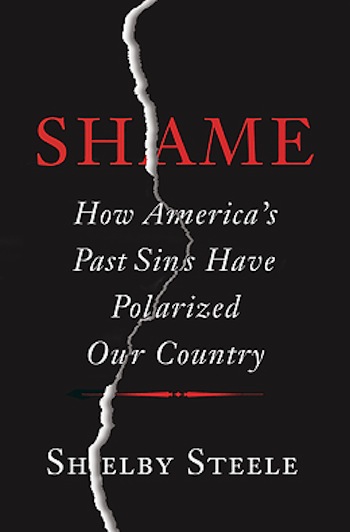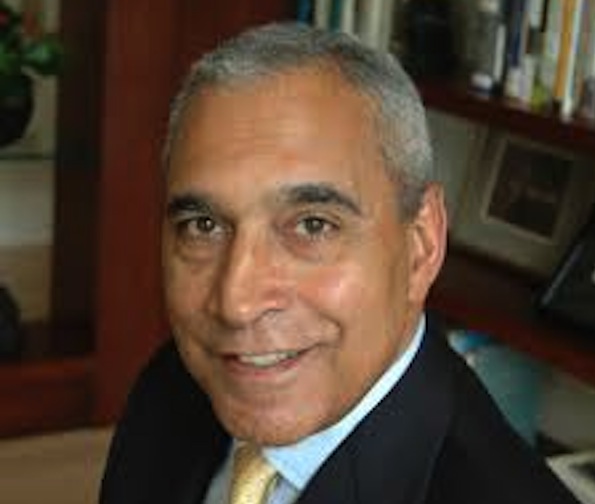Book Review: “Shame” — Racism and the Sins of Paternalistic Liberalism
According to Shelby Steele, white liberals “dissociate” themselves from the past sins of white America by subscribing to the “poetic truth” that the United States is “characterologically evil.”
Shame: How America’s Past Sins Have Polarized Our Country by Shelby Steele. Basic Books, 198 pages, $25.99.
By Blake Maddux

As an African-American who is politically conservative, author Shelby Steele – a scholar at the Hoover Institution at Stanford University – “confound[s] expectations” and “inevitably gives offense,” to use his words. This is because, Steele believes, anyone of his background “is presumed liberal simply for being black.”
Born in 1946 to a black father and white mother in Chicago, Steele writes in his new book Shame, “my life had to always be negotiated around my failure to be white,” and that his family was “afraid to cross the threshold of any restaurant until [he] was almost twenty years old.”
Having been raised by civil rights activists, Steele understood the appeal of the idea that African-Americans were “owed” something for the centuries of unequal treatment that they had suffered and that the government that once acted to oppress them should now act to uplift them. Although he did not embrace this philosophy lock, stock, and barrel, he does acknowledge having “fellow-traveled for a while with black nationalism” and that he “never voted for Ronald Reagan.”
If he hadn’t be ideologically born again for quite a while, the latter decision alone would seemingly disqualify him from being welcome among contemporary American conservatives. By the late 1970s, however, Steele writes, “to my great surprise[,] I found the idealism I believed in more in what conservatives were saying than in what liberals said.”
“I found conservatism,” he adds, “to offer the stark fairness of true freedom in which success and failure are always possible, a fairness of disinterested equanimity.”
This conservative conversion, coupled with his experience as an African-American in pre- and post-1960s America, led him to author books such as The Content of Our Character: A New Vision of Race in America, White Guilt: How Blacks and Whites Together Destroyed the Promise of the Civil Rights Era, and A Dream Deferred: The Second Betrayal of Black Freedom in America.
Although I have not read any of Steele’s previous volumes, his most recent one, a slender tome titled Shame: How America’s Past Sins Have Polarized Our Country, seems to be a concise reassertion of his earlier ideas.
Unlike most conservatives, born-again or otherwise, Steele (who has a Ph.D. in English from the University of Utah) does not wish away the 1960s. He praises the Civil Rights Movement, the women’s movement, the antiwar movement, and “even the sexual revolution,” which “did in fact humble and transform America” by making “the point that America could not go back to hypocrisy as a way of life,” and reveled that “our great principles and traditions had not saved us from our hypocrisies.”
When Steele affirms that “the genius of the Left was to unveil the tragedy of American hypocrisy and evil,” he does not mean “genius” in a tactical or deceptive sense. Although it might be a bit too strong of a word, he honestly believes that the Left did the nation a big favor.
Furthermore, Steele declares straight-up that the decades prior to what was “arguably the most fundamentally transformative decade in American history” was not the halcyon, prelapsarian paradise that some people like to think it was.
Rather, he writes, “This innocence had always been a delusion. It was far more a cultivated ignorance of America’s sins than innocence of them, and this ignorance was helped along by a culturally embedded pattern of rationalizations, bigotries, stereotypes, and lies.”
Thus, the flaw for Steele is not so much 1960s liberalism but the “new liberalism” of subsequent decades. Liberals’ identification of America’s mistakes was not problematic — it is their solutions for correcting them.
The feeling among white liberals that they were at least partially responsible for the subjection of African-Americans and women led them suffer from what Steele calls “white guilt.” This in turn led them to believe that they were required to employ the immense power and massive resources of the federal government to “restore past victims and to redeem past victimizers.”
Of course, the power to do good and the power to do ill are opposite sides of the same coin. Steele writes that new liberalism’s attempt to do the former has resulted in a “paternalistic liberalism that has imposed itself through a series of ineffective and even destructive programs and policies.”
Conservatives of all stripes would surely agree with this assessment, and white liberals (including me) would probably at least be willing to hear his case for such a claim.
However, early on in Shame Steele ramps up his argument, trumpeting the red meat propositions that “white paternalism toward minorities…has damaged the black family more profoundly than segregation ever did” and that “the benevolent paternalism of white guilt…had injured the self-esteem, if not the souls, of minorities in ways that the malevolent paternalism of white racism never had.”
I could not help but wonder if statements such as these would cause even the proverbial choir members to stop paying attention. After all, white racism resulted in terrors up to and including slavery, which itself included torture, rape, and murder. Interestingly, the words “slave” and “slavery” are mentioned only a handful of times in the book, even though one has to presume that that human bondage must be among the “past sins” to which Steele refers in the title. (And by handful, I mean literally able to be counted with all of the digits on one hand.)
And while Steele wastes no time in acknowledging the pervasive malevolence of racism, toward the end of Shame he recalls that most whites when he was growing up believed that their behavior toward blacks was “simply recognition of natural law” and that they “were quite polite about this…it was not proper to humiliate [blacks] for their lowly position.”
“Their prejudice, if it was prejudice at all, was perfectly impersonal,” Steele would have us believe.
Now, I am a white man from a small town in southeastern Ohio that is pretty much right on the cusp of Appalachia. I have learned what I know about America’s ugly racial history from teachers (including my father, who taught high-school American history in the 1960s) and assorted media (e.g., books and documentaries). I could never claim to know what it was or is like to be an African-American or any other minority in this country.
Still, it is almost equally impossible for me to believe that the racial climate in which Steele lived as a young man somehow constitutes the good old days compared to the decades in which, by the author’s own admission, “America morally evolved so that these old American evils [racism and sexism] became more ‘poetic’ than literal.”
There are plenty of grounds on which to criticize the ill effects of public policies such as the War on Poverty, affirmative action, and school busing without resorting to the nonsensical claim that they have been worse in their good intentions than racism had been in its intentional evil, ignorance-is-bliss politeness, and/or fatalistic recognition of God’s will.
In short, Steele runs a bit too far past the finish line in his support of Barry Goldwater’s idea, which he does not quote, that “government cannot be the provider without being the master.”
But perhaps I am proving Steele’s point, perhaps fallen right into his trap. I am, after all, a white liberal. If I am anything like all others who have identified as such for the past century, then I seek – according to Steele – to “dissociate” myself from the past sins of white America by subscribing to the “poetic truth” that the United States is “characterologically evil.”

Author Shelby Steele — his book is a hearty mix of sociology, political science, history, and personal memoir that is sure to stimulate the intellectual gears. Photo: Rita Steele.
Steele is convinced that if I were to evince any support for the idea that white men are no longer responsible for the de facto second-class citizenship to which minorities and women are (supposedly) still subject, then I would be putting myself in league with those who helped ensure the historical de jure relegation of such status. My refusal to do so is, in the author’s words, “to scream at the world, ‘No! I am not of the America that partook of evil. No doubt others are, but not me!’”
Beneath all of this, if the thesis of Shame is correct, sits the familiar conservative accusation that what me and my fellow white liberals’ really want is continued political power and an ever-increasingly strong federal government. The poetic (i.e., not actual, but useful) truth of the continued suffering of minorities and women is the liberal justification for social programs that unwittingly do more to slow the upward mobility of their intended beneficiaries than to hasten it.
Lacking expertise of the facts and figures that might undermine or buttress Steele’s premises and conclusions, the best that I can do is scrutinize Shame on how well its author presents his case. In that respect, I am not convinced that my own political views are an unavoidable result of a psychological disposition or that white male liberalism – which operates with the support of many non-whites and non-males – has been more destructive than the combined forces of white racism and male sexism.
That said, Shame is a hearty mix of sociology, political science, history, and personal memoir that is sure to stimulate the intellectual gears that have possibly grown rusty regarding the issues that Steele addresses.
Blake Maddux is a freelance journalist who also contributes to The Somerville Times, DigBoston, Lynn Happens, and various Wicked Local publications on the North Shore. In 2013, he received a Master of Liberal Arts from Harvard Extension School, which awarded him the Dean’s Prize for Outstanding Thesis in Journalism. A native Ohioan, he moved to Boston in 2002 and currently lives with his wife in Salem, Massachusetts.
.
